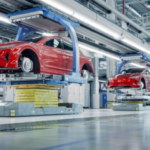Last month, a significant legal case against Asda advanced as tens of thousands of employees initiated a lawsuit claiming that shopfloor workers, predominantly women, are paid less than their male counterparts in warehouse positions. This legal action alleges a violation of equal pay legislation, echoing growing concerns over wage disparities within the retail sector.
The Asda case follows a recent ruling in favor of workers at Next, where an employment tribunal determined that the retailer failed to justify the pay gap between its warehouse staff—primarily men—and shopfloor employees, who are mostly women. Next has announced plans to appeal the decision, which could result in up to £30 million in compensation for the claimants. The case was handled by the law firm Leigh Day, with funding provided by Harbour Litigation Funding.
Leigh Day has also initiated similar equal pay claims against other major retailers, including Morrisons, Tesco, Sainsbury’s, and the Co-op. The firm confirmed that these cases involve over 100,000 retail employees across the UK and are being pursued under a damages-based agreement, a funding model that allows claimants to pursue justice without upfront costs.
David Williams, an employment partner at the City law firm Fox Williams, emphasized the pressure facing the retail industry. “There’s quite a degree of concern within the retail sector, stemming from various sources. The potential liabilities are enormous due to the number of people involved and a historical lack of attention to equal pay,” he said. “This is a wake-up call for many companies to audit their practices and address salary disparities.”
Therium Capital Management, another litigation funder, is supporting the legal actions against Tesco. Founded in 2008, Therium manages multiple litigation funds collectively valued at $36 billion, with a history of backing high-profile cases, including legal action against the Post Office and supporting Noel Edmonds in his dispute with Lloyds Bank over issues related to its HBOS subsidiary.
Litigation funders raise capital from sources such as hedge funds and sovereign wealth funds to finance various claims, with successful outcomes enabling further investments in legal actions. While this funding model facilitates access to justice, it has raised concerns. Critics argue that it contravenes common law principles against champerty and maintenance, which historically prohibited third parties from profiting from legal disputes.
The surge in class action lawsuits and third-party funding has prompted alarm within the business community. A recent report by the Adam Smith Institute highlighted that these legal mechanisms could expose many companies to claims worth billions. The US Chamber of Commerce has been actively lobbying against the spread of class action litigation and related funding models in the UK and Europe, likening them to contentious practices in the United States.
In England and Wales, two types of no-win, no-fee agreements have gained prominence. The traditional conditional fees model allows lawyers to claim an uplift of up to 100% on their standard fees for winning cases, while the newer damages-based agreements—similar to US contingency fees—permit lawyers and their third-party backers to claim up to 50% of awarded damages. This shift has caused unease among defendant companies facing potential litigation, raising questions about the future of legal funding practices in the UK.









